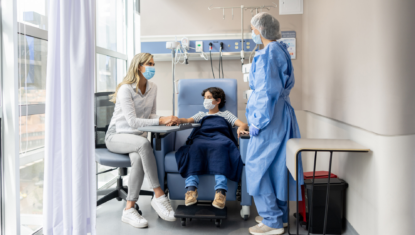24/10/2024
Ottawa, Ontario — Thursday October 24, 2024

When a child is diagnosed with glioblastoma, the most common and aggressive type of brain cancer, it marks the start of a long and arduous journey.
After undergoing neurosurgery to remove as much of the tumour as possible the child begins a standard treatment of radiation therapy and chemotherapy. While these treatments target cancerous cells, they can also cause a number of side effects.
In the longer term, radiation therapy can run the risk of damaging healthy cells, impacting the developing brain and causing secondary cancers elsewhere in the body. Physicians are always careful to weigh the treatment plan against the risks facing the patient, but scientists continue to investigate novel ways to treat this life-threatening illness.
Dr. Nirav Thacker, a pediatric oncologist at CHEO and Investigator at the CHEO Research Institute, is collaborating with clinician scientists at The Hospital for Sick Children (SickKids) as the Principal Investigator of the first clinical trial to attempt to treat glioblastoma in a subgroup of patients, without radiation and chemotherapy.
“The possibility of being able to effectively treat glioblastomas without the use of chemotherapy and radiotherapy could revolutionize the way we treat these high-grade gliomas while having an incredible impact on the quality of life for these kids. Leading this important clinical trial from CHEO in collaboration with our partners at SickKids as the sponsor has been years in the making. The vision of this home-grown Canadian trial is to have impact not only locally, but globally,” said Dr. Thacker.
Radiotherapy and chemotherapy sparing approach to brain cancer therapy
Previous research has shown that some glioblastomas have an increased number of variations within their cancerous cells, leading to poor outcomes for children and a survival rate at relapse of only one to two months. In a 2022 study published in Nature Medicine, researchers showed for the first time that in these recurrent tumors, which had already received radiotherapy and chemotherapy, immunotherapy could help prevent further recurrence. What’s more, a subgroup of these hyper-variated tumours were much more responsive to immunotherapy, leading to a significantly increased survival rate at four years after diagnosis.
This first-of-its-kind clinical trial will investigate the use of immunotherapy without radiotherapy for patients with these highly mutated and immunotherapy-receptive glioblastomas.
Over the course of the clinical trial, the study team, will monitor the patient’s response to the immunotherapy to determine whether immunotherapy alone is an effective treatment. The team hopes that their findings will help spare children the potential risks associated with radiotherapy, but they will adapt treatment as needed to provide the best available care for each patient, including returning to radiotherapy if necessary.
A global effort for childhood cancer treatment
The trial is the result of over 15 years of effort and will reach countries around the world thanks to the International Replication Repair Deficiency Consortium (IRRDC), a collaborative research initiative co-led by Dr. Uri Tabori, Senior Scientist at SickKids, and Dr. Anirban Das, Staff Physician and Project Investigator, made up of more than 45 countries.
The trial will open at SickKids, the North American centre for the trial, and will expand beyond North America to open sites in India, Jordan and Australia later this year with more sites to follow.
The clinical trial, entitled U-R-Immune Glioma, is in collaboration with the Arthur and Sonia Labatt Brain Tumor Research Centre (BTRC) and is funded by the Anti-Cancer Fund and the Canadian Institutes of Health Research (CIHR).
